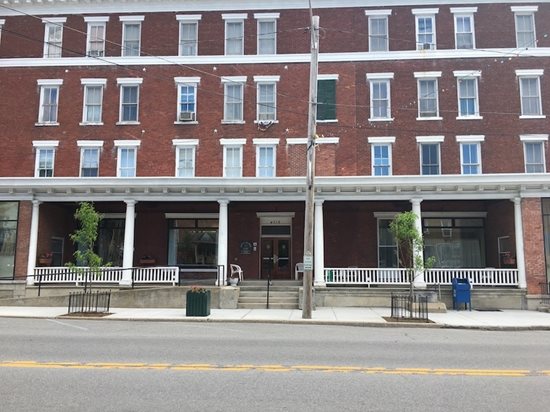The residents who live in Lee House, a senior apartment building owned and operated by the Housing Assistance Program of Essex County (HAPEC), take care of each other. The building, an historic Port Henry hotel in Elizabethtown, New York, converted to affordable housing, has 25 residents who make sure their neighbors make it to doctor’s appointments or to the grocery store to pick up food or an extra container of wipes. But in the fall, the familiar network of support was impacted when a resident contracted COVID-19.
Until that point, HAPEC had been using a $25,000 grant from NeighborWorks America’s Critical Relief Fund to buy personal protective equipment for residents and provide extra cleaning in the buildings. The fund, which had a significant impact, was created to help network organizations help their residents and was made possible through a generous contribution from the Wells Fargo Foundation.
After the first resident got sick, however, everyone who had worked in the building needed to go into quarantine in case of exposure. That meant HAPEC’s cleaning and maintenance staff and property manager all needed to quarantine for 14 days, along with the building’s friendly residents.
Testing, organized by HAPEC in the parking lot behind Lee House, found that 10 residents had contracted the virus. Three of them had to be hospitalized. Meanwhile, the building needed continued deep cleaning to help prevent the virus from spreading. The quarantined staffers couldn’t do it. So, Bruce Misarski, executive director of HAPEC, began to search for a local cleaning crew. When word that the building was on lockdown hit the front page of the newspapers, however, in-town organizations responded with a quick “no.”

Finally, Misarski contacted Service Pro, an organization that responded to emergencies. HAPEC had used the organization during a fire years ago. They were expensive, he says, and in another part of the state, but they mobilized quickly. The NeighborWorks funding helped him pay for the cleaning, which in turn, helped residents continue to live safely in their homes. The Wells Fargo Foundation, early on in the pandemic, made a pledge to try to keep people housed during the related economic downturn. The foundation, in partnering with NeighborWorks America, helped ensure that organizations across the country were supported, as they served their residents and communities.
HAPEC also used funding to continue to pay quarantined staff, and another cleaning company closer to home. They concentrated on making sure their residents had essentials, like food. Fortunately, a Meals on Wheels partner continued to ensure healthy meals for residents, with the Meals on Wheels director often making deliveries himself during the quarantine. Others in the community helped, too, and residents continue to help each other, especially with groceries. They want to be there for each other, Misarski says.
“It was hard,” says Rhoda Bailey, who has lived in Lee House for two years. “When you’re told you can’t do something, that’s exactly when you want to do it. We couldn’t grocery shop or visit the neighbors or go to the doctor. My nurse’s aide couldn’t come in. It was tough.”
The staff, along with the health department, made her feel better. “They were trying their best to make us feel safe,” she says. The cleaning helped. “I think they went from the top of the walls to the bottom of the walls. The desks. The chairs. You name it, they cleaned it.”
Ben Hanson, the building’s maintenance manager, lives in a HAPEC-owned apartment next door to Lee House. But he, too, was quarantined after the exposure. He couldn’t fix plumbing or electrical issues for residents. He couldn’t go to his evening job at the paper plant, either.
“Thank God nothing broke for two weeks,” he says. He returned to work facing no major breakdowns, aside from a leaky sink.
Hanson says the community was helpful in bringing together groceries. They were delivered to his door, too, by a person dressed in full protective gear. Being able to have someone deep-clean Lee House was helpful, too, he says.
The extended lockdown added to the everyday operational challenges of managing an apartment complex. When a client got bedbugs, HAPEC was able to mitigate the issue by purchasing a heater and tent system to help eradicate them. Thanks to the support and funding they received, they now have an additional tool to support their work and will be able to help other properties if they encounter the same issue.
Currently, residents in Lee House are doing well. Everyone who contracted COVID-19 survived, and residents are taking the need for social distancing seriously as they await vaccinations.
Like the crucial cleaning at HAPEC, funding from NeighborWorks and its partners has helped organizations make some vital pivots to provide critical services throughout the pandemic.
Further reading: During the pandemic, isolation has been a problem, especially for older adults. A NeighborWorks toolkit offers help in engaging, supporting and empowering them.

